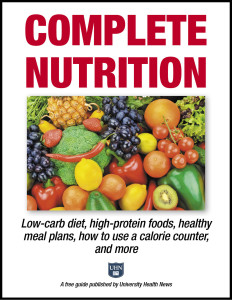Protein Powder Do’s and Don’ts
Protein powder is most popular (and typically marketed to) athletes and bodybuilders. But it also has caught on with a broader range of consumers—people of various ages and activity levels—who are looking to improve daily diet habits. But what can protein powder actually do for you? And how do you know which type to buy?
Let’s start with what we already know about protein. It’s a dietary essential that all health experts agree should be consumed every day to maintain or increase muscle mass and bone health. It can be abundantly found in foods, including meats, poultry, vegetables, eggs, cheese, milk, seeds, and nuts.
The Recommended Dietary Allowance (RDA) for protein is 0.8 grams per kilogram of body weight, or 0.36 grams per pound; that’s 47 grams for a person weighing 130 pounds and 54 grams for a person weighing 150 pounds. In recent years, researchers have found that older adults may need 1.0 to 1.2 grams of protein per kilogram, or 0.45 to 0.55 grams per pound, to support healthy aging.
You’ll also need to consume more protein if you’re very active or you engage in intensive strength training to ensure that your muscles get the fuel they need. This is where protein powder might benefit your diet.
Eat Right, Starting Now!
Download this expert FREE guide, Complete Nutrition: Low-carb diet, high-protein foods, healthy meal plans, how to use a calorie counter, and more.
Create healthy meal plans and discover the Superfoods that can transform your plate into a passport to better health.
The Benefits of Protein Powder
Protein powders are made of the dehydrated forms of protein-rich foods, such as whey, casein, egg whites, soy, hemp, peas, and brown rice. Each serving contains between 10 and 30 grams of protein per serving.
While the ideal way to consume protein is through whole foods, protein powder could help those dealing with low appetite and digestive issues. It’s also a good way for those with very busy schedules to ensure that their reaching their recommended dietary protein allowance.
Protein powder can be mixed with water, milk, or other liquids, and it can also be sprinkled into oatmeal, muffin batter, casseroles, shakes, and smoothies. Many protein powder products come flavored with cocoa, vanilla, peanut butter, and/or fruit to make them more palatable, but unflavored varieties are best for mixing into savory foods.
Remember, however, that protein powder isn’t meant to replace meals—only to supplement them—so it’s important to continue eating a variety of healthy foods.
Choosing the Right Protein Powder for You
Most protein powders are egg- and/or milk-based, so if dairy’s a regular part of your diet, then these are good choices for you. However, if you have any dairy and/or egg sensitivities or allergies, are adhering to a vegan diet, or are lactose-intolerant, then you’ll want to choose a plant-based protein powder.
When choosing a vegan protein powder, however, you might run into a few that are bitter in taste or gritty in texture, so you might have to try a few varieties to find the one that tastes the best to you. Many varieties of vegan protein powder also have green vegetables and other natural ingredients mixed in, so read the label carefully before choosing.
What to Watch Out For
Although it’s called protein powder, many varieties of this supplement contain a lot more ingredients—some of which aren’t needed. When reading the labels, look out for these ingredients, all worth avoiding:
- Sugar and artificial sweeteners. Too much sugar can sabotage your goals by adding unnecessary calories into your diet. If your digestive system is sensitive to certain artificial sweeteners, you’ll want to avoid those as well.
- Oils. Some protein powders contain high amounts of plant, vegetable, or fruit oils that can be healthy for you in small amounts, but could also lead to weight gain from the added calories.
- Too much protein. Not all protein powders are made equally. Some contain a lot more protein than you might need, especially if they’re marketed to bodybuilders and athletes. Too much protein can cause nausea and bloating, plus it can prevent your body from absorbing other essential vitamins and minerals.
- Added vitamins and minerals. This may not sound like a bad thing, but if you’re already taking daily multivitamins and eating a healthy diet, too many vitamins and minerals can cause serious health problems.
If you’re having trouble finding the right protein powder for you, consult your doctor or nutritionist. Until then, you can try adding non-fat milk powder (if you consume dairy) to your liquid of choice as an affordable alternative.
Can Protein Powder Help You Lose Weight?
The answer is both yes and no. Many manufacturers claim that their products can help you burn fat and lose weight, but that’s not necessarily the case.
Some companies instruct you to replace meals with protein powder shakes, which may help you lose a little weight in the beginning, but, in the long run, is unsustainable. But, according to LiveStrong.com, if you consume protein powder as a part of a low-calorie diet along with exercise, you’ll be able to get the results you’re looking for.
According to a recent studies, whey protein is best for weight loss because, when combined with exercise, it has been shown to promote muscle growth and to be more effective at suppressing appetite than other protein sources.
If you have a goal of losing weight and you want to incorporate protein powder into your diet, the most important thing to remember is to be careful what you mix it with. A large smoothie containing full-fat yogurt, juice, sherbet, large amounts of fruit, chocolate, or honey can sabotage your diet with high amounts of sugar and calories.
The post Protein Powder Do’s and Don’ts appeared first on University Health News.
Read Original Article: Protein Powder Do’s and Don’ts »
Powered by WPeMatico


